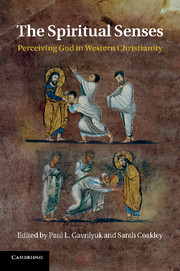Book contents
- Frontmatter
- Contents
- Contributors
- Foreword
- Abbreviations
- Introduction
- Chapter 1 Origen of Alexandria
- Chapter 2 Gregory of Nyssa
- Chapter 3 Augustine
- Chapter 4 Gregory the Great
- Chapter 5 Pseudo-Dionysius the Areopagite
- Chapter 6 Maximus the Confessor
- Chapter 7 Alexander of Hales
- Chapter 8 Thomas Gallus
- Chapter 9 Bonaventure
- Chapter 10 Thomas Aquinas
- Chapter 11 Late medieval mystics
- Chapter 12 Nicholas of Cusa
- Chapter 13 Jonathan Edwards and his Puritan predecessors
- Chapter 14 John Wesley
- Chapter 15 Karl Rahner and Hans Urs von Balthasar
- Chapter 16 Analytic philosophers of religion
- Select bibliography
- General index
- Index of select biblical references
- References
Chapter 3 - Augustine
Published online by Cambridge University Press: 05 December 2011
- Frontmatter
- Contents
- Contributors
- Foreword
- Abbreviations
- Introduction
- Chapter 1 Origen of Alexandria
- Chapter 2 Gregory of Nyssa
- Chapter 3 Augustine
- Chapter 4 Gregory the Great
- Chapter 5 Pseudo-Dionysius the Areopagite
- Chapter 6 Maximus the Confessor
- Chapter 7 Alexander of Hales
- Chapter 8 Thomas Gallus
- Chapter 9 Bonaventure
- Chapter 10 Thomas Aquinas
- Chapter 11 Late medieval mystics
- Chapter 12 Nicholas of Cusa
- Chapter 13 Jonathan Edwards and his Puritan predecessors
- Chapter 14 John Wesley
- Chapter 15 Karl Rahner and Hans Urs von Balthasar
- Chapter 16 Analytic philosophers of religion
- Select bibliography
- General index
- Index of select biblical references
- References
Summary
That human happiness consists in the perpetual vision of God is one of the hallmarks of Augustine's thought and the tradition that he left to the Western theological world. However, Augustine also employs the language of sound, smell, taste and touch – collectively or individually – to describe the Christian's relationship with and experience of God. In order to participate in this sensory life, Augustine suggests that in addition to the bodily senses the human being possesses the spiritual senses, capable of perceiving God and God's activity in the world. Both sets of senses are an integral part of an embodied human existence in this life and the next.
Since the publication of Karl Rahner's influential essay on Origen and the spiritual senses in 1932, a limited but important body of scholarship has sought to explore Augustine's treatment of the spiritual senses. Many of these studies have concentrated on spiritual vision (an emphasis reflected in the Augustinian corpus), have been restricted to specific texts or have appeared in larger discussions of Augustine's epistemology and mysticism. Despite these studies, no exhaustive examination of spiritual sensation has yet appeared. Space limitations rule out the possibility of producing such a study here, but this chapter will provide a survey of Augustine's understanding of the spiritual senses by first discussing their corporeal counterpart before proceeding to follow the spiritual senses in three thematic areas: the goal of human perceptual life in the beatific vision, the current dysfunction of these senses due to sin and finally their conversion and restoration by grace. By exploring this topic in such a way, this chapter will show that, according to Augustine, the spiritual senses allow embodied humans to know God and God's immaterial and ineffable presence in the world in an immediate and intimate way.
- Type
- Chapter
- Information
- The Spiritual SensesPerceiving God in Western Christianity, pp. 56 - 70Publisher: Cambridge University PressPrint publication year: 2011
References
- 2
- Cited by



